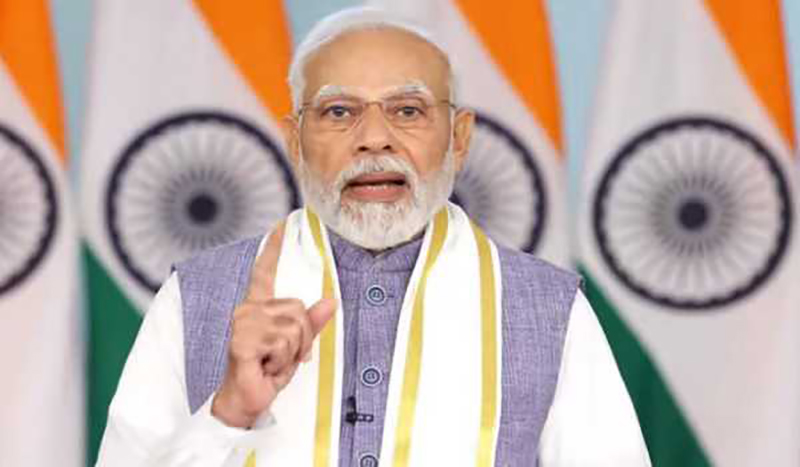 Narendra Modi
Narendra Modi
India using technology as weapon in war against poverty: PM Modi
Bengaluru/UNI: Prime Minister Narendra Modi on Wednesday said India is using technology as a weapon in the war against poverty.
"Under the Svamitva scheme, we are using drones to map lands in rural areas. Then, property cards are given to the people. This reduces land disputes.
"It also helps the poor to access financial services and credit," he said in a pre-recorded video message at the inauguration of Bengaluru Tech Summit 2022.
Modi said India showed how technology could be a force for good when many countries were struggling due to lack of infrastructure during Covid pandemic.
"During Covid-19, many countries were struggling with a problem. They knew people needed help.
"They knew benefit transfers would help. But they did not have the infrastructure to benefit people. But India showed how technology could be a force for the good," he said.
"Our Jan Dhan Aadhar Mobile Trinity gave us the power to directly transfer benefits. Benefits went directly to authenticated and verified beneficiaries. Billions of rupees reached the bank accounts of the poor," he stated.
Modi said his government helped the pandemic-hit small businesses and street vendors by providing them access to working capital to restart businesses.
"Those who start using digital payments are given incentives. This is making digital transactions a way of life for them," he said.
Modi said India has shown how to democratise technology and give tech a human touch when technology was seen as an exclusive domain which was said to be only for the high and mighty.
In India, technology is a force of equality and empowerment, which is mirrored in the world's largest health insurance scheme Ayushman Bharat that provides a safety net for about 600 million people. "This programme is run based on a tech platform," he said.
India ran the world's largest Covid-19 vaccine drive through a tech-based platform called Cowin, he said.
Modi said the central government is successfully running its ecommerce platform called Government e-MarketPlace (GeM) for small businesses and traders, who fulfills the government's needs.
"Technology has helped small businesses find a big customer. At the same time, this has reduced the scope for corruption. Similarly, technology has helped with online tendering.
"This has accelerated projects and boosted transparency. It has also hit a procurement value of Rs 1 trillion last year," he said.
Also low data costs helped poor students to attend online classes during the pandemic, without which, two precious years would have been lost for them, Modi said.
"India has one of the largest online repositories of open courses. There are thousands of courses available across different subjects. Over 10 million successful certifications have happened. This is all done online and free," he said.
India's data tariffs are among the lowest in the world, the Prime Minister said.
Modi said the Indian youth are being empowered by increasing tech access which is reflected in broadband connections rising from 60 million to 810 million and smartphone users from 150 million to 750 million, in the last 8 years.
"The growth of the internet is faster in rural areas than in urban areas. A new demographic is being connected to the information superhighway," he said.
Modi said India's youth have ensured tech and talent globalisation."Healthcare, management, finance – you will find young Indians leading many domains. We are using our talent for global good. Even in India, their impact is being seen," he said.
From ranked 81st in 2015, India has jumped to the 40th rank in the Global Innovation Index this year, Modi said.
"The number of unicorn startups in India has doubled since 2021. We are now the third largest startup hub in the world. We have over 81,000 recognised startups. There are hundreds of international companies that have R&D centres in India. This is due to India’s talent pool," he said.
Modi said technology is being used to end silos, enable synergy and ensure service.
"On a shared platform, there are no silos. Take, for example, the PM Gati Shakti National Masterplan. India is investing over Rs 100 trillion in infrastructure over the next few years. The number of stakeholders in any infra project is huge. Traditionally, in India, big projects were often delayed. Exceeding expenses, and extending timelines used to be common," he said.
"But now, we have the Gati Shakti shared platform. The central government, state governments, district administrations, different departments can coordinate. Each of these knows what the other is doing.
"Information relating to projects, land use and institutions are available at a single place. So, each stakeholder sees the same data. This improves coordination and solves problems even before they occur. It is accelerating approvals and clearances," he added.
Modi said India is no more a place known for red tape, but known for red carpet for investors in terms of FDI reforms, liberalization of drone rules, steps in the semiconductor sector, production incentive schemes in various sectors, or the rise of ease of doing business.
Support Our Journalism
We cannot do without you.. your contribution supports unbiased journalism
IBNS is not driven by any ism- not wokeism, not racism, not skewed secularism, not hyper right-wing or left liberal ideals, nor by any hardline religious beliefs or hyper nationalism. We want to serve you good old objective news, as they are. We do not judge or preach. We let people decide for themselves. We only try to present factual and well-sourced news.







